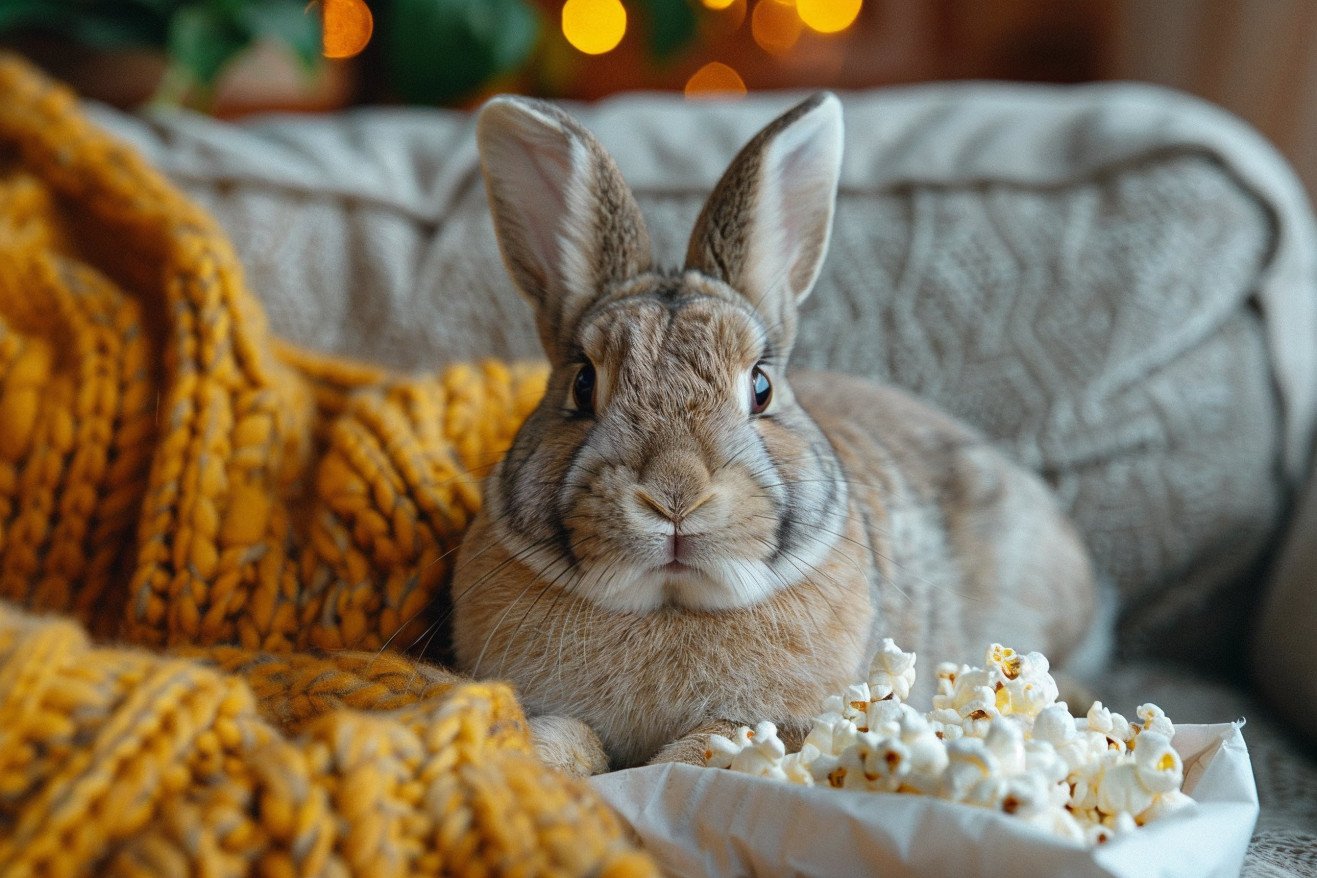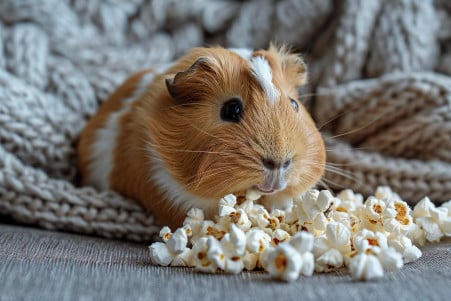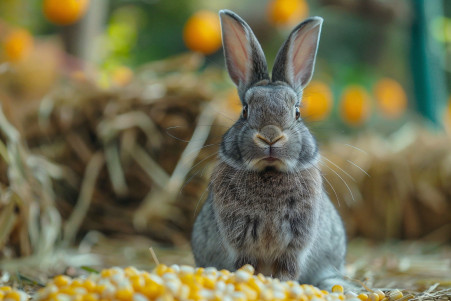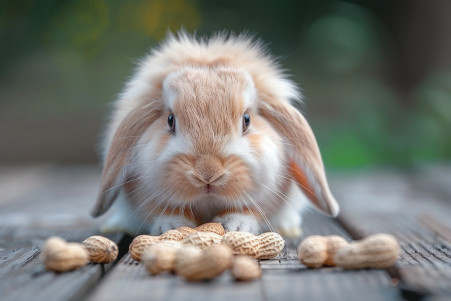Can Rabbits Eat Popcorn? Occasional Treat or Dietary No-No?
18 April 2024 • Updated 17 April 2024

If you’re thinking about giving your rabbit a piece of your movie-time snack, you may be wondering if popcorn is safe and healthy for your furry friend. Unfortunately, popcorn is not good for rabbits. The high levels of starch and carbohydrates in popcorn can lead to digestive problems, including bloating, gas, and obesity in rabbits. Since rabbits are meant to get their nutrients from hay, fresh vegetables, and a small amount of pellets, popcorn doesn’t offer any nutritional value.
That said, new studies have shed light on whether or not a small amount of popcorn is OK for rabbits to eat on occasion. By looking at the latest veterinary research and the nutritional content of popcorn, we can determine if it’s OK to let your herbivorous pet indulge in popcorn every once in a while. The idea is to make sure that your rabbit stays healthy while still being able to enjoy a special treat every now and then.
Can rabbits eat popcorn?
What Do Rabbits Eat in the Wild?
In the wild, rabbits eat a wide variety of foods, including grasses, herbs, and leafy weeds. They also consume the bark of small twigs and young, tender shoots. In the winter, they eat evergreen needles and buds. Wild rabbits will also eat their feces to get the maximum amount of nutrients from their food.
Rabbits are herbivores, which means that they only eat plant material. They have a special digestive system that allows them to break down the cellulose in plant material and extract the nutrients from it. This system requires them to eat a high-fiber diet.
What Should Pet Rabbits Eat?
Pet rabbits should eat a diet that is similar to the one that they would eat in the wild. This means that they should eat a lot of hay. In fact, hay should make up 80-90% of a rabbit's diet. The best types of hay for rabbits are grass hays, such as timothy, orchard grass, brome, and oat hay, according to the Best Friends Animal Society.
In addition to hay, rabbits should eat fresh vegetables and leafy greens. These should make up about 10% of a rabbit's diet. The Animal Trust suggests that rabbits eat a handful of vegetables that is the same size as the rabbit's body once a day. They also suggest that rabbits eat a variety of vegetables, including bell peppers, Brussels sprouts, and leafy greens. The Save A Fluff rescue recommends that rabbits eat 1 cup of vegetables for every 4 lbs of body weight each day.
Pellets or nuggets can be used to supplement a rabbit's diet, but they should be fed in small quantities. The RSPCA suggests that rabbits eat 1-2 tablespoons of pellets a day. Some foods should never be fed to rabbits because they can cause digestive problems. These foods include chocolate, corn, potatoes, and beans, according to the Best Friends rescue.
It's important to introduce any new foods to rabbits slowly over a period of 2-4 weeks to avoid digestive upset, according to the Save A Fluff rescue. A diet that is high in fiber and includes a variety of foods will ensure that rabbits get the nutrients that they need to be healthy. This type of diet will also help rabbits avoid foods like popcorn that don't have any nutritional value for them.
Popcorn Hazards: Choking and Digestive Risks
Popcorn kernels, popped or unpopped, are a choking hazard for rabbits because of their small size and shape. Per PetEveryday, popcorn is the perfect size and shape to get stuck in a rabbit’s throat, which can be life-threatening.
In addition to the choking hazard, the high levels of carbohydrates and starch in popcorn can lead to a variety of digestive issues for rabbits. According to PetsFoodSafety.com, eating popcorn can lead to obesity, gastrointestinal issues like gas and bloat, and even digestive blockages in rabbits.
Many types of popcorn, especially those with added flavors or seasonings, are high in salt, which can be especially problematic for a rabbit’s sensitive digestive system. Per CanRabbitEatIt.com, even air-popped popcorn that doesn’t contain any added flavors or salt should be avoided because it has no nutritional value and can still cause digestive issues.
Popcorn should be avoided, especially for young rabbits under the age of 6 months and those with dental problems, as their digestive systems may be even more sensitive. However, it’s best to avoid popcorn altogether to ensure a rabbit’s health and safety.
Accidental Popcorn Consumption: Symptoms and Veterinary Treatment
If a rabbit has eaten popcorn, it's important to keep a close eye on them for any signs of distress or discomfort. According to the BinkyBunny forum, potential symptoms to look out for include lethargy, loss of appetite, digestive issues like diarrhea or constipation, and signs of pain or discomfort.
In more serious situations, eating popcorn can result in complications like gastrointestinal blockages or poisoning, both of which will require professional medical care. The RSPCA explains that if a rabbit is showing signs of illness after eating popcorn, it's important to contact a vet right away so that they can provide an accurate diagnosis and treatment.
In the meantime, offering supportive care, like their favorite treats and a gentle belly massage, can help to relieve any discomfort that they may be experiencing while you wait for a vet's advice, according to the BinkyBunny forum. By keeping a close eye out for symptoms and seeking medical care when necessary, rabbit parents can make sure that their pets are taken care of.
How to Switch to a Better Rabbit Diet: Gradual Changes
If a rabbit has been eating unhealthy foods like popcorn, it's important to switch them to a healthier, hay-based diet slowly. This is because, according to Burgess Pet Care, rabbits have sensitive digestive systems and a fast transit time, which can cause digestive upset if their diet is changed too quickly.
The change should be made over a period of 2-4 weeks, with the new, healthier foods being gradually increased and the old, unhealthy foods being gradually decreased, according to the PDSA. When it comes to introducing new types of hay or fresh vegetables, it may take time and experimentation to get the rabbit to eat them, says Small Pet Select.
It's important to keep an eye on the rabbit's health, behavior, and fecal output throughout the transition to make sure they are adjusting to their new diet without any problems, according to VCA Animal Hospitals. By making changes to a rabbit's diet slowly, owners can ensure their pets get used to a healthier, hay-based diet while minimizing the risks associated with unhealthy foods like popcorn.
Conclusion: Meeting Your Rabbit's Dietary Needs
While you may think it's okay to give your rabbit a popped kernel every once in a while, popcorn is not a safe treat for rabbits and should be avoided. A rabbit's diet should focus on high-quality hay, fresh vegetables, and a small amount of pellets to ensure they get the nutrients they need. It's also important to introduce new foods to rabbits slowly and watch for any signs of an adverse reaction when changing their diet.
By making sure your rabbit gets a balanced, hay-based diet and avoiding inappropriate foods like popcorn, you can help ensure your pet rabbit stays healthy and happy. If you have any questions about your rabbit's diet, a vet can help you make sure you're meeting their dietary needs and address any issues that arise.


